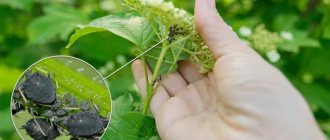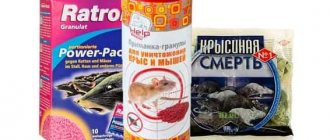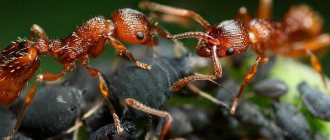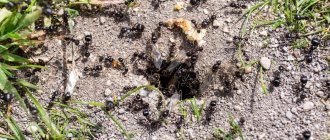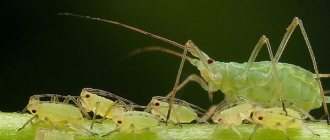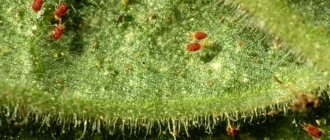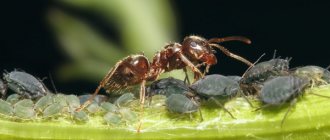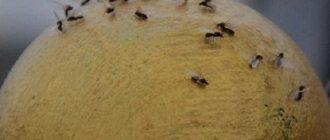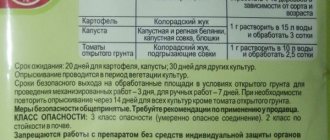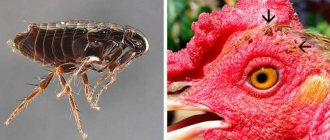The aphid population causes enormous damage to almost all types of plants. These small insects damage all above-ground parts of green spaces and can destroy not only fruit, berry, and vegetable crops, but even indoor potted plants. Aphids feed on plant sap, infect them with various diseases, and also contribute to the spread of other unwanted guests on the site - ants. There are many varieties of aphids, but the appearance of this pest on the site, if timely measures are not taken, can threaten great damage to the garden.
Chemicals are often used to control pests on the site, but traditional methods are no less popular. Chemical preparations are distinguished by their rapid action and high efficiency, but they cannot be used during flowering, fruiting and some time before harvesting. Then folk methods come into play. They are the safest and can be used throughout the entire growing season of fruit and vegetable crops; moreover, the ingredients for medicinal decoctions and infusions can always be found on the site, in the kitchen and in the medicine cabinet.
Extensive colonies of aphids can cause irreparable damage to garden crops
Briefly about the activities of aphids
All summer residents and gardeners constantly work with their plants so that they do not get sick and produce good fruits and remain beautiful. Aphids begin their activity in March; mainly young plants are attacked. Aphids multiply on everything from common weeds to the queens of the garden - roses. Aphids reproduce from the bottom of leaves and often occupy the entire surface of newly grown plants. Next you will learn how to get rid of this insect and prepare the correct solution for aphids.
Mustard
It is no secret that aphids are spread throughout the area by ants, which, in turn, feed on the sweetish secretions of these pests. Mustard powder will help drive them away from the area. Scatter it in places where ants are most active, on their paths. Additionally, you can make a bedding around the plant that needs to be protected from aphids.
You can also prepare a mustard solution by mixing 100 g of powder with 10 liters of clean water. “Charge” the sprayer with it and treat the infected plants.
Aphid solution: aphids carry diseases
Aphids are indeed a very dangerous pest; they can carry many diseases and viruses that negatively affect the life and growth of plants. If an aphid brings the virus to a plant, hard growths will begin to form on its leaves. Aphid larvae are carried by ants from their homes to trees. A soap-containing solution will help you fight both ants and aphids.
How to prevent aphid attacks
If you start fighting a short time after the insect attack, it will not be difficult to overcome. Trees and plants will need the first treatment in mid-spring when leaves begin to form. Soap dissolved in water will help prevent ants from crawling onto the plant, and in most cases they introduce the pest. Correct and timely processing will contribute to the life of the plant.
So, the first treatment is carried out in mid-spring. Aphids attack and love not only trees with fruits, but also, for example, cucumbers. In spring, cabbage may be attacked. If the soapy water with which the plant was sprayed stops helping, you can purchase special protection - a collar. It is put on the stem/trunk of a tree and prevents the ant from crawling to the leaves.
Advantages and disadvantages in the fight against insects
Special insecticides will help you fight, and if you want to get rid of pests and cause minimal harm to the ecology of the site, folk remedies will be the best choice.
Benefits of folk remedies against aphids:
- many of them not only destroy insects, but also act as fertilizer, saturate the soil with useful substances, stimulate plant growth and increase yield;
- Generally safe when used correctly;
- do not have an unpleasant odor, which is the problem with most insecticides;
- available and cheap;
- they can be used to prevent the appearance of aphids in the garden;
- quickly destroy pests.
Among all the methods of combating aphids, there is no ideal one, and folk remedies, despite their apparent safety and high efficiency, have their drawbacks.
Disadvantages of traditional methods:
- are not absorbed into the fabric of leaf plates, remain on their surface, and therefore are easily washed off when watering or after rain;
- in most cases, they do not act immediately; repeated treatments are necessary;
- some folk remedies are unsafe for humans (ammonia), it is necessary to use protective clothing when processing;
- If the instructions for use are not followed, they can cause burns on the leaves.
Plants should not be sprayed with any means on a bright sunny day . Drops of the solution can act as a lens and burn the leaves.
Aphid solution: home remedies
When dealing with insects using home methods, you will need to devote much more time and effort to the process than when using chemicals. When using insecticides, plants will get rid of insects + will be protected throughout the summer. Homemade methods are of course less dangerous for both humans and plants, but they cannot destroy the insect population, only scare them away. Typically, folk remedies are used once a week, repeating three times. There is a chance that the procedure will have to be repeated.
What to choose
How to properly prepare the same soap solution. Any soap film will create conditions under which insects simply cannot feed. Thus, they will either die or migrate. It is important to choose the right soap if the solution contains only soap and water. Antiseptic types and those with a disinfecting effect are best suited.
Laundry soap
Laundry soap - everyone knows, it’s cheap, when it hits the pest directly, it dies.
Green soap Green - can be found in gardening stores, has a gel-like form, in fact it is an insecticide.
Tar soap
Tar soap is very strong and, most importantly, effective.
Toilet soap
The decorative soap that we often use in everyday life is not suitable for fighting insects. These types of soap use dye and various fragrances; they can harm the plant, not just the pests. After rain or watering, harmful substances will enter the soil and then into the plant. This will not be good for you or the plant.
How to process flowers
Aphids love roses very much, so most likely you have already fought against them. The juice of rose buds and flowers is very attractive to pests. The soap solution will help against aphids and when treating roses, it will be extremely effective. To improve the effect, you can add a little ash. Three liters of water, plus one hundred grams of grated laundry or baby soap, plus two hundred grams of wood ash are the ingredients needed for the solution. The solution should sit for six hours. Typically, plants are treated with the solution in at least three approaches.
Recipes
Let's look at the most effective recipes for spray solutions with soap.
Ash-soapy
It is very effective to use wood ash along with laundry soap for pest control. To prepare the spray, sift the ash through a sieve to separate large fractions from the fine dispersion - they are not needed for the solution. A total of sifted finished ash powder will require 300 grams.
Place a metal bucket with 10 liters of water on the stove and pour ash into it. Bring the mixture to a boil, and after boiling, cook for another half hour. Then you need to cool the resulting brew (but not completely), and dissolve grated laundry soap in it in an amount of 40 grams.
This solution should not be used when plants are in flower. When ash gets on the delicate petals, they become unattractive, including to pollinating insects. It is better to treat flowering bushes and trees with clean soap foam.
Soap and soda composition
To prepare this product you need to take a tbsp. a spoonful of soda (heaped) and one-fourth of a standard piece of laundry soap (grated). Mix the substances, place in a metal ladle, and pour in a liter of boiling water.
Stir until smooth - this will be a concentrate. Then the resulting composition is diluted with a bucket of cold water and used for spraying plants.
Soap and tobacco solution
Aphids are known to dislike strong-smelling substances and plants. Tobacco is one of these plants. Adding tobacco to spray solutions is therefore very effective. To make the solution, you need to take 200 grams of dry tobacco (leaves or shag), grind it into dust, pour it into a bucket of water, and add a couple of pods of hot pepper for strength.
Oil solution
In this case, to prepare the damaging composition, use laundry soap and vegetable oil in equal parts. It is recommended to take a glass of oil and the same amount of soap shavings for a bucket of water.
All components should be mixed, beaten until the soap is completely dissolved, and then used to spray garden plants against aphids, as well as to nourish the soil. The oil helps the soap solution stay on the surface of the leaves for a longer period, as it protects it from fading in the sun and rolling off to the ground. As a result, processing efficiency increases.
With tomato tops
This remedy can also be used quite effectively to eliminate aphids in the garden. To prepare, you need to finely chop 4 kg of tomato tops (fresh) and place them in a metal bucket. Pour the plant material with ten liters of water and leave for 4-6 hours.
After infusion, the composition is boiled, bringing to a boil, and then for another half hour. Add 50 grams of grated soap to the resulting liquid, mix everything and filter.
Aphid solution: aphids on berries
If an aphid appears, then like a dictator, it wants to take over everything. You can talk about processing berry bushes separately. If insects forge the currants into the solution, you will need to add baking soda. Mix fifty grams of soap and a tablespoon of soda, then dissolve the mixture in one liter of warm water. The infusion should stand for six hours and then it must be strained. Plants are pollinated with all soap-containing solutions. As a rule, treatment is carried out once every two days for about fourteen days. If the aphids have not yet had time to multiply greatly, you can carry out the procedure three times every seven days, then look at the plants. If the aphids have not returned for a week, everything is fine. It is necessary to repeat until the aphids completely leave the plant.
When using home remedies, walk around the area often enough; aphids can fly and move without the participation of ants. Watch the plants and help them.
Universal folk remedies
The effectiveness of such methods is lower than that of chemicals, but treatment with folk remedies is practically safe for plants, fruits, bees and humans. At the same time, it should be borne in mind that in case of large-scale damage to trees by aphids, such methods may be of little use. Trees must be treated several times at intervals of 3 days.
Compositions based on baking soda
Baking soda solution is the most affordable and safe means of treating plants. To prepare it, you need to dissolve laundry soap in boiling water at the rate of 1 tbsp. l. chips in 2 liters of water, cool, add soda (4 tbsp.).
To completely destroy parasites, the infected tree should be treated completely - the entire trunk, branches and crown with young leaves.
Tobacco dust
There are two options for using tobacco dust: spray the trees with the prepared infusion and fumigate the pest with tobacco smoke. To do this, you need to light a small fire in the garden, observing all fire safety measures, then put it out and sprinkle tobacco dust on the hot coals. In this case, the direction of the wind should be taken into account, since the smoke should flow towards the affected trees.
Garlic infusion
Finely chop or crush garlic (3 cloves), add water (1 liter) and place in the refrigerator for 24 hours. Strain the infusion and pour into a spray bottle. Treat trees as usual.
Ammonia
It has a sharp unpleasant odor that can repel insects (aphids, ants and others), but it is completely harmless to human health. Another advantage of the fragrant solution is that, once in the soil, ammonia acts as an additional fertilizer for fruit-bearing trees.
- One of the following folk recipes will help you get rid of aphids in your garden:
- Dissolve baby washing powder (1 tbsp) in water (5 l), add ammonia (4 tbsp).
- Grind a piece of laundry soap, dilute the resulting shavings in warm water (10 l). As soon as the soap has completely dispersed, add ammonia (50 ml) to the solution. Pour the resulting composition into a container with a spray bottle and treat the affected trees, focusing on the locations of the pest and young shoots.
The treatment must be repeated several times, taking a break between procedures of 1-2 days. It is best to spray in the evening, when pollinating insects fly away from the garden. You should not spray the plantings in rainy weather, as the manipulation will have no effect.
These folk remedies are suitable for treating both fruit and berry trees.
